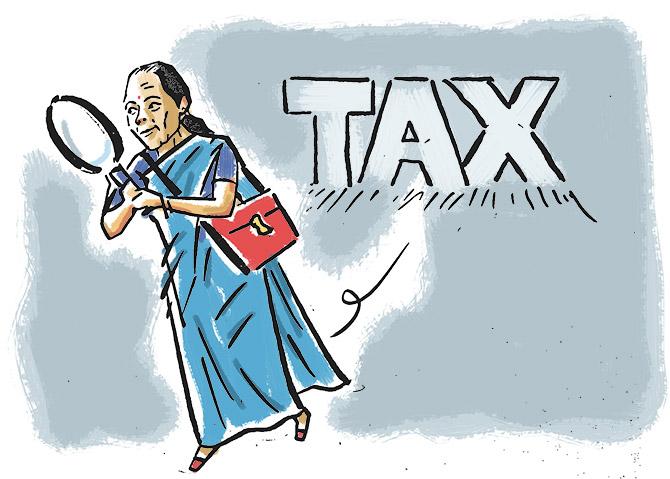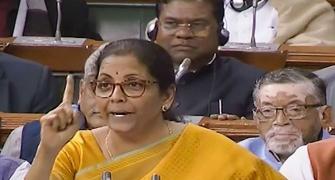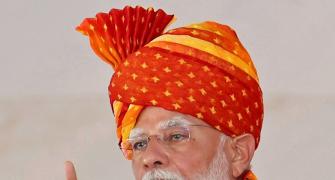'If you do quick back-of-the-envelope calculation, someone earning Rs 10 lakh can get a benefit of anywhere between Rs 35,000 and Rs 45,000, even if s/he is availing exemptions.'
'A large proportion of people do not avail full exemptions as they don't have money to invest in those schemes.'

"We need to keep working to have a flat tax and no exemptions," Chief Economic Advisor Krishnamurthy Subramanian tells Arup Roychoudhury and Dilasha Seth.
Though you have expanded your FY20 and FY21 fiscal deficit targets, compared to earlier estimates, it was still a fiscal contraction year-on-year. Should there have been a bigger stimulus?
This is the beauty of comparisons. When you use different benchmarks, the same comparison can have different meaning.
So, at least for me, the way I would look at it is that before the Budget, we were actually looking at 3.3 per cent for this year and 3 per cent for next year.
And we have taken the Fiscal Responsibility and Budget Management Act relaxation of 50 basis points to go from 3.3 per cent to 3.8 per cent for this year, and 3 per cent to 3.5 per cent for next year. That's the way I look at it.
Now, many have commented on whether there should have been a greater stimulus push.
In the Economic Survey, what we basically said is in this delicate balance between fiscal prudence and a spurt to growth, we said we need to lean on growth, we did not say put your full weight on growth.
Because, if you look at the experience from 2009-2010, when after the global financial crisis we let fiscal deficit go up indiscriminately, we had the taper tantrum in 2013 and India became part of the fragile five.
As they say, if you don't learn from history, (you) are condemned to repeat it.
So, the worry this time was that if we go for indiscriminate fiscal expansion, 2-3 years later, we may actually have a similar problem.
Macro stability is non-negotiable. We have come close to the sweet spot in ensuring that we've given a growth spurt and maintained discipline as well, within the ambit of the framework provided by the FRBM Act.
With so many import duty announcements in the Budget, are we going back to being protectionist?
I like making a distinction between finished goods and raw materials. In raw materials and intermediate goods, custom duties have been brought down, which is good.
For exports of finished goods, imports of some of these intermediate products are important. And that's what we have shown in the Economic Survey as well.
It is important to keep in mind this distinction between finished goods and intermediates and raw materials.
This is important, rather than painting it in one stroke, calling it protectionist.
High-cost economy comes from imports of intermediates and raw materials not being allowed.
The cost for a producer is basically either the raw materials or the intermediates, and I've been very clear on that.
This is about the delicate balance between domestic production, imports, and enabling exports as well.
If you are charging higher import duties for finished goods, that doesn't really affect the cost structure for producers, so it's really important to make that distinction.
In media interactions, the economic affairs secretary said economists want to play a T-20 cricket match to make themselves popular.
The DIPAM secretary said the idea of a Temasek-like holding company for PSUs (proposed in the Economic Survey) needs to be debated.
What are your thoughts as an economist and author of the survey?
The T-20 versus Test match debate is a good characterisation of economic policy, of taking care of the short run versus taking care of the long run.
What we have done is we are playing a Test match. With the Budget, we are in Test match mode.
The role of the Economic Survey, in some parts, is to foster debate.
Mentioning the Temasek model has led to discussions on its pros and cons. I think that is important.
Just because we have recommended something does not mean it should immediately get implemented.
It has to be debated. But by bringing it into the into the policymaking arena, we actually encouraged debate on that.
As an academic, I am absolutely comfortable with that.
The revenue estimates for the next fiscal again appear unrealistic with direct tax growth pegged at 12.7 per cent, as against a nominal gross domestic product growth rate of 10 per cent.
Besides, for FY20, even the revised target of 2.9 per cent appears high, considering that we are hovering at a negative 6 per cent...
There has been a strong emphasis on getting the projections as realistic as we can.
Therefore, in this Budget there has been an emphasis on transparency compared to the previous two Budgets.
The realistic 10 per cent growth rate and a tax buoyancy at 1.2 per cent is easily achievable.
And with some of the measures like Vivaad se Vishwas scheme introduced, I don't think they are unrealistic.
There are close to 500,000 cases under dispute. While it is very hard to Budget the exact amount of these, even normal tax numbers should be achievable.
The annexure to the Budget speech showing off-Budget items is a step towards transparency.
Overall, there has been a real emphasis on being as realistic and transparent as possible.
With you being a member of the direct tax committee that submitted its report in August last year, what do you have to say on the personal income tax cuts introduced in the Budget?
The report is not in the public domain, so I cannot talk about that. But I can talk about the tax proposals in the Budget.
As an economist, if I were to design a tax scheme it will be a flat rate scheme.
I will get rid of all exemptions. The Income Tax Act is so voluminous because we kept adding clauses for the last 50 years, which gives people the opportunity to interpret it in different ways.
Tax research shows that a simple scheme is efficient and enables to garner greater revenues.
Getting rid of exemptions is a move in the right direction.
If you do quick back-of-the-envelope calculation, someone earning Rs 10 lakh can get a benefit of anywhere between Rs 35,000 and Rs 45,000, even if s/he is availing exemptions.
According to the data put out by the department of revenue, a large proportion of people do not avail full exemptions as they don't have money to invest in those schemes.
It is a step in the right direction, but we need to keep working on it to have a flat tax and no exemptions.
But one argument says the proposal will discourage savings...
In the last Economic Survey we showed research from Asia and other countries that savings depend a lot on demography and not on incentives.
People in the 35 to 50 age group save the most.
People in the 25 to 35 age group do not save that much as they focus more on consumption.
It is important to keep that in mind.




.jpg)




